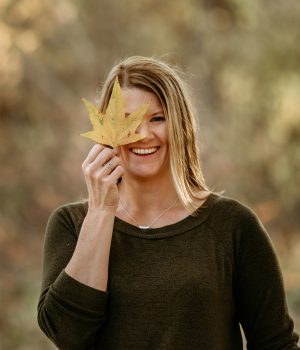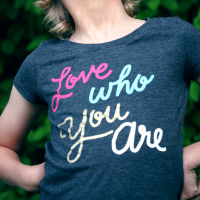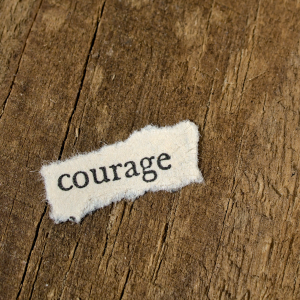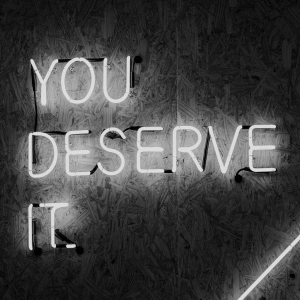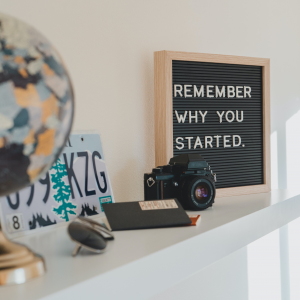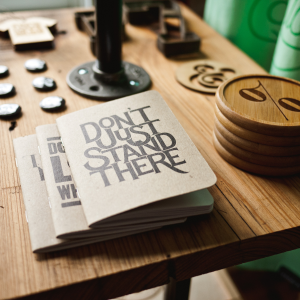Episode 87: Join me for part 2 of the 3-part series, Real + Brave = Unstoppable. In this episode I talk about how to cultivate and practice courage (especially the courage to be authentic!) and why it’s a crucial ingredient for creating YOUR unstoppable life.
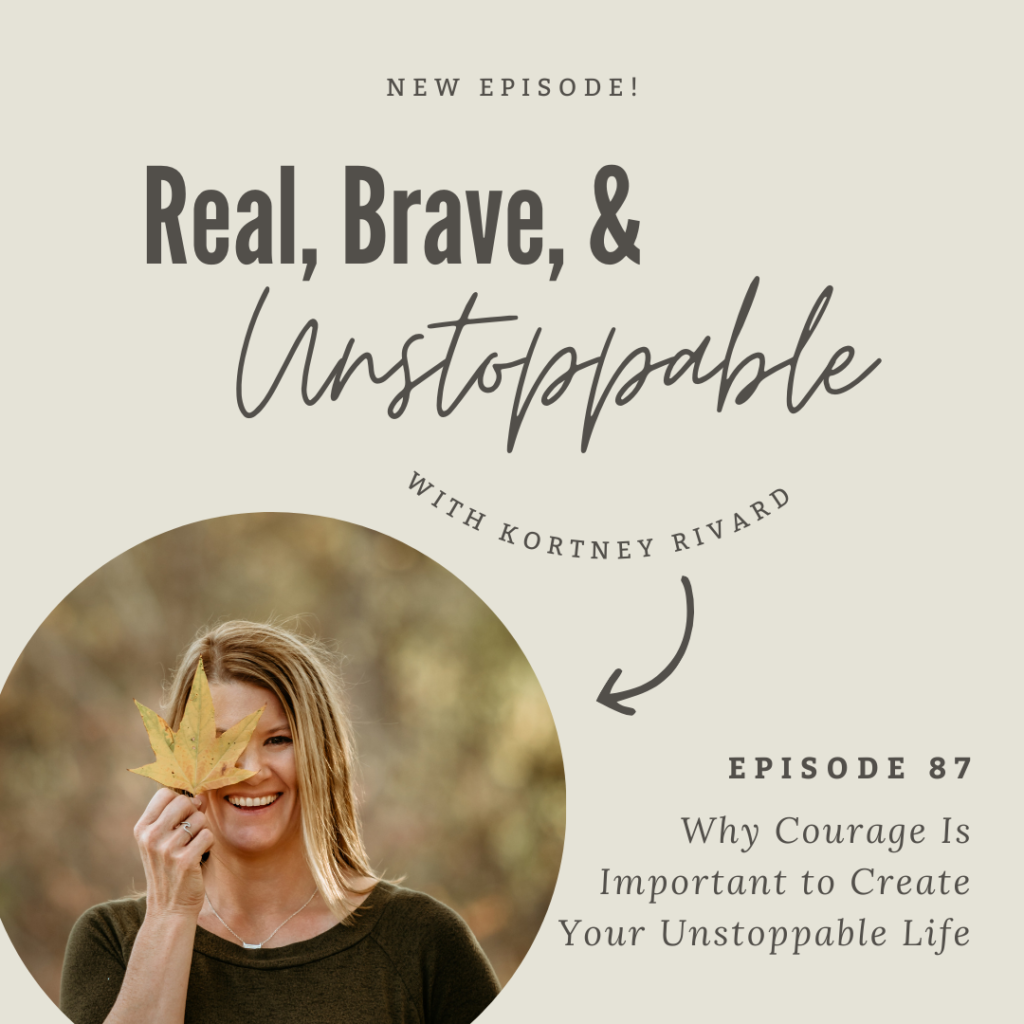



Prefer to read an article? Visit Kortneyrivard.com/blog
Show Notes:
Part 2 of a 3-part series,
This week, I talk about cultivating courage. Cultivating courage is a crucial ingredient in creating YOUR unstoppable life.
In this episode you’ll learn:
- what courage means – both heroic courage and ORDINARY courage
- why you need courage to be authentic and be in your truth
- why it’s hard to find courage sometimes
- ways you can cultivate courage in your own life so you can show up and be fully seen and create your big, epic, unstoppable life.
Listen to the full episode to get all the details!
Resources
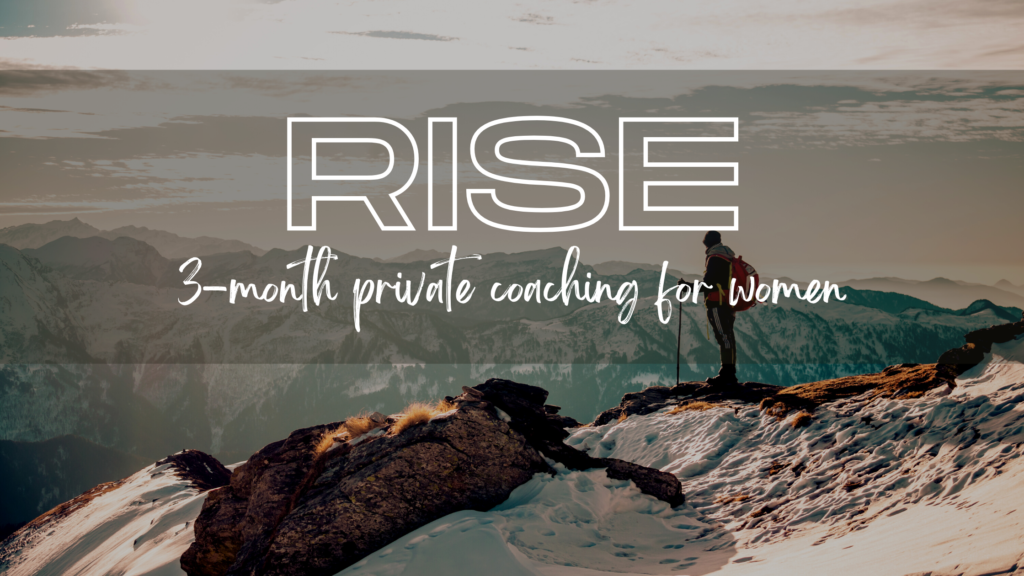
RISE in courage!
Creating YOUR bigger and better life will drive up all kinds of limiting beliefs and stories that will keep you playing small. I can help you start playing in the big leagues so you can create the life you want.
The #1 regret of the dying is “I wish I had lived a life that was true to who I am instead of the one others thought I should live.”
Don’t let this be YOUR regret. Check out RISE: a 3-month private coaching program designed for you to get your bearings after a big life transition (divorce, breakup, empty nesters, career change, etc), reconnect with your authentic self, and create a plan to move into action toward the life you’ve always wanted.
Check out the 3-month program HERE.
Feeling stuck? Don’t know where to start?
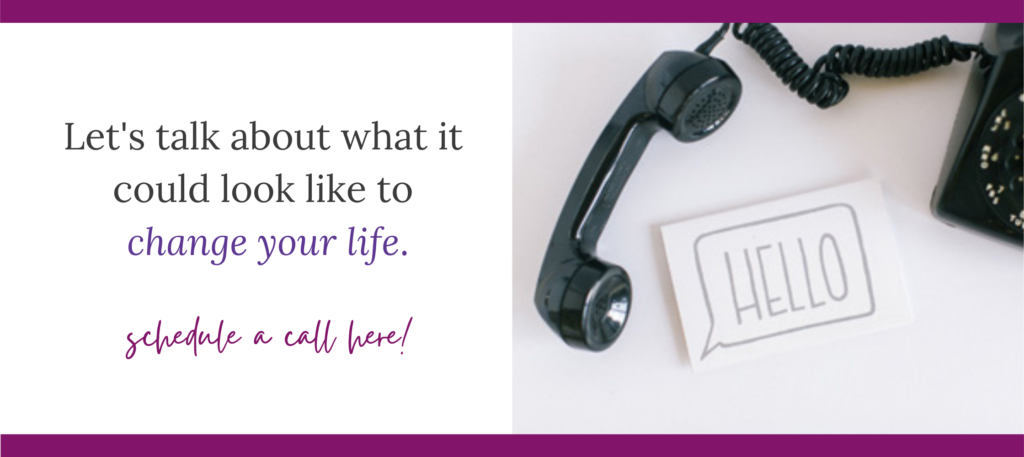
Create an unstoppable life. Schedule a call at www.kortneyrivard.com/lets-talk
Visit https://kortneyrivard.com/lovelife to download a free guide on how to create a life you love!
Support the show (https://www.buymeacoffee.com/kortneyrivard)
You May Also Like:
- Episode 82: How to Cope with Loneliness
- Episode 78: How to Bounce Back from a Breakup (or other life upset)
- The Real, Brave, & Unstoppable full episode catalog
Transcript:
Episode 86 take 2: cultivating courage
[00:00:00] Well, hello everyone and welcome back to the podcast. I hope you enjoyed my replay of Lessons from Pema Chodron last week! As I mentioned, I had this episode on how to cultivate courage recorded and decided to scrap the whole thing. Cause it just wasn’t what I wanted to deliver to you.
[00:00:18] So, um, I spent a week with it. I changed up some stuff, got a little more clear on what I wanted you to get from this. So I hope that you get something from this episode on cultivating courage and why it’s a crucial ingredient in creating YOUR unstoppable life. So we’ll get to that in a minute, but I am headed to Orlando this afternoon, or I guess I should say early evening, for a retreat and I’m going to get my level two,
[00:00:45] it’s called Sourced™ Retreat Leader Certification. And I’m really excited about this because I have wanted to do retreats for a long time. It’s really important for me in my work to cultivate a community of women that are like-minded and want to live authentically, and have the courage to do that. And to just live their lives full out.
[00:01:13] So I’m really excited to get that certification.
[00:01:15] Okay, let’s dive in to the episode. So today I mentioned, I’m talking about courage and cultivating courage in your life. The first part in this three-part series was all about cultivating authenticity. And I mentioned in that episode that it takes courage to show up authentically.
[00:01:40] And then we’ll talk about why, and I talked about a little bit about why in part one, but it does, it takes courage to show up authentically. Showing up and being seen in your full you-ness, your full personhood. It feels risky. It’s vulnerable because you’re opening yourself to criticism, to failure, to having to admit to mistakes, all, you know, things like that.
[00:02:11] So it’s really important to know how to cultivate courage in your life if you’re going to live a bad-ass, epic, unstoppable life. That’s where you live your life and as alive as you can be. So what is courage? Well, if you look it up in the dictionary, Merriam-Webster always go there,
[00:02:38] it’s defined as the mental or moral strength to venture, persevere and withstand danger fear or difficulty.
[00:02:48] That definition, which obviously has merit because it’s in the dictionary, doesn’t really totally do it for me. It feels kind of sterile and soulless. To me, courage is more of a heart word. It has more of a feeling to it for me. And wouldn’t, you know, it, I’m not the only one who thinks. So because it turns out in the book, The Gifts of Imperfection by Brene Brown, she says the following, which is beautiful:
[00:03:18] The root of the word, courage is core –the Latin word for heart. In one of its earliest forms, the word courage had a very different definition than it does today. Courage originally meant to speak one’s mind by telling all one’s heart. Over time this definition has changed and today courage is more synonymous with being heroic.
[00:03:41] Heroics are important and we certainly need heroes, but I think we’ve lost touch with the idea that speaking honestly and openly about who we are about what we’re feeling and about our experiences. Good and bad is the definition of courage. Heroics is often about putting your life on the line. Ordinary courage is about putting our vulnerability on the line in today’s world
[00:04:07] that’s pretty extraordinary.
[00:04:09] I love that because it really encapsulates how I feel about courage. It resonates so deeply with me that we have lost touch with the idea that speaking honestly and openly about who we are about what we’re feeling and about our experiences– good or bad– that is courage. Because those are the things that we end up being afraid to do because of we’re afraid of what will happen if we do.
[00:04:37] It’s putting that vulnerability on the line. What if we’re vulnerable? What do we open ourselves up for? And then we are, then we have to deal with the uncomfortable feelings that come from whatever comes from being vulnerable. And I’ll give some examples in a minute, but I think the topic of how to cultivate courage is such a beautiful topic.
[00:05:00] And this really came to the surface for me last week, as I co-hosted an online summit called Unapologetically You and I’m sure you’ve heard me talk about it if you follow me. The summit featured speakers talking about why it’s so important to pause and get intentional about connecting to who you really are and what you really want without apologizing for any of it.
[00:05:24] Our speakers covered a range of topics from defining what wealth means to you and living your life that way, living that definition of a wealthy life. And it’s different for everyone. Also cultivating beautiful relationships, trusting your intuition to help you in your career
[00:05:45] and your life, and ending burnout and exhaustion. I spoke about rebuilding your life after a setback, and we had other topics too. But interestingly enough, as diverse as all of these topics are, there was one common thread that ran through all of them. And that thread was that we do really have to take a moment and pause to turn inward, to ask ourselves who we are, what’s important to us and what it is that we
[00:06:13] truly want in our lives, not what we think other people think we should have or not what we think we should have or what we, you know, we want because society has this, you know, standard that’s been drilled into our head. It really takes so much courage to get honest about what you really want. It takes courage to step outside of your comfort zone to claim the life that you want, not the one that you or others think you should do.
[00:06:42] If you think about the phrase, “keeping up with the Joneses”, I mean, how many times have you ever, and not everyone is like this, but you know, sometimes I’ve been this way before where I feel like, you know, maybe I need to dress a certain way. Because it’s the way that everyone else is dressing. Or I look at like when my son was little, I’m a very casual person.
[00:07:06] Like, you know, I’m a big hiker and outdoors-y person. So, you know, jeans and a t-shirt, that’s my jam. I like to dress up sometimes, but it’s not my comfort zone. Like I do not wear heels… I love wearing heels when I dress up, but I don’t wear shoes with any form of heel when I’m just out and about.
[00:07:27] Just definitely not. But when my son was little and I would volunteer for his class or at school, there were a lot of the moms who would be just totally done up. Full makeup, heels and just, you know, like they’re going out. And I sometimes felt like really small. Like I like small because I wasn’t, I felt in my head wasn’t measuring up to that.
[00:07:51] And so in my head that was a should. Oh, I should be dressing like that. And I didn’t do that, but it was sort of a way of me saying, oh, I’m not good enough because I don’t dress like that. So I was making that a should in my life. I should be doing that. And so for me to like, to turn inward and get honest about it, that’s not who I am.
[00:08:13] I don’t need to wear heels and full makeup and, you know, fancy clothes to go volunteer at school or go to the grocery store or whatever. That’s just not who I am. And if that’s who you are, that is awesome. Own it. I’m owning my casualness and it’s all good. Right? Or you know, houses. When I got married and, you know, we bought our, third house, fourth house…
[00:08:40] I don’t know, I lose track, but the last house that we owned was my dream house. It was beautiful. It was really big. And people were so impressed by it. And I loved it too. Don’t get me wrong. I loved that house. And someday I would love to have a house, maybe not as big, but you know, similar. I really loved that house.
[00:09:02] But what I learned is, you know, for a long time, I think that having a tiny house that wasn’t, you know, super attractive from the outside – I had created a should in my life that that to be successful, we had to have a house that was big and, not fancy, but you know, like impressive.
[00:09:28] And I realized after I got divorced and we had to sell that house, that I really wasn’t any happier when I had that house. So I learned that for me, if I’m going to be authentic, I need to look at what’s important to me. That’s not really as important to me. Would I love to live in a house like that again?
[00:09:47] Sure. But it’s not something that defines my life and it’s not something that I’m going to feel bad about myself for that I don’t have a house like that. So those are some examples of where you create a should life.
[00:10:01] But knowing how to cultivate courage and having the courage to claim who you really are and the life you really want brings us right back to what courage originally meant. To speak one’s mind by telling all one’s heart. What’s on your heart? What is important to you? What do you stand for? And what happens to us that we end up settling for a life that’s not in integrity with our hearts and souls?
[00:10:25] Why do so many people settle? Why don’t people know how to cultivate courage? And, well, this really boils down to thoughts, stories, limiting beliefs that are running on autopilot in our heads. It’s like a computer program. These narratives were “installed” in our brains over time. And since our brains really like to be efficient, we don’t end up putting much thought into whether these programs are helpful.
[00:10:48] When I was growing up, when we got our first computer, I don’t remember how old I was, but the first computer, it wasn’t like today where it’s plug and play. There was no such thing as Windows yet. No, it was, you turned on the computer and a command line showed up. I remember my dad doing all the things, installing the BIOS and using MS-DOS commands to like, that’s how you called up programs. You had to type it in a command line. So, but you had to tell the computer, like you had to give it all the programs. So it knew what to do, like the, the underlying programs. Today that all already comes loaded on our computers or we load software on.
[00:11:37] Underneath all of it, the program that runs the computer, it just runs on autopilot all the time. It doesn’t stop to think about it. So before the age of seven, we don’t have the capacity in our brain. It’s not developed enough for us to be able to discern what we believe. You know, we just kind of record.
[00:11:57] We’re on record for the first seven ish years of our lives. And so that’s recording the computer program. When we get older, we have all these programs that have been developed, or installed. Like I said, based on limiting beliefs and the stories we’ve been told and put there by the people in our lives that are old enough to discern.
[00:12:22] And so what happens is some of these programs, like I said, we don’t really put a lot of thought into whether these programs are helpful or not. And so many of them aren’t. So the program that tells you to breathe. That’s very helpful. The program that tells you not to ask for what you need, because you’re afraid you’ll be an imposition,
[00:12:43] that’s not helpful. There’s a story there that tells you that you’re not enough. That you shouldn’t be an imposition to someone. That’s not a helpful story. So the unhelpful programs, they keep us in performance mode. They keep us pretending to be someone that we’re not really, they keep us playing it safe from things like failure or judgment, getting hurt and other things, but they also keep us in perfectionism, pessimism, people pleasing,
[00:13:13] and self-sabotage. Those are some fear patterns that when we get triggered, we fall into, but those keep us living the version of our life that we think is the quote unquote, right one or the one that we or others think we should live. Okay. So the unhelpful programs, they really keep us living out of integrity with who we really are in our hearts and our souls. They keep us from knowing how to cultivate courage.
[00:13:40] Why is that a bad thing? Well, I mean, it’s probably kind of obvious, but let’s dig into it because when you’re living someone else’s version of your life, you are not really living. So many people talk about needing to find their purpose. Well guess what? Your purpose can be found when you live life as the person that you came here to be on this planet.
[00:14:03] When you live the life, your meant to live, your purpose naturally falls into place. I really believe that when you start listening to your heart and your soul, your life just becomes so much easier and in flow, you feel more grounded and content. So back to courage and why living your life takes courage, living the life that you want takes courage.
[00:14:28] So being fully you without apology is living your purpose. Living your purpose makes you feel alive and well purposeful. And this is the place of being, like I said, is where you feel most in flow and grounded and content, but being fully, you is really vulnerable. And we don’t really like to be vulnerable because what happens when we’re vulnerable and it doesn’t work out for us, we have all kinds of emotions.
[00:15:00] A big one is shame.
[00:15:03] But showing up and letting yourself truly be seen is vulnerable. Because you do risk things like failure, being judged, making mistakes, and having to admit to them, speaking up for what you believe in or getting hurt when you’re in a relationship and you want to, and you really love someone. You’re risking a lot.
[00:15:25] Right? So here’s an example of what it’s like to practice this and open yourself to vulnerability. When I got divorced, I had been out of my aerospace engineering career for 12 years. I left the industry to be a mom. And while I later started a part-time photography business, it wasn’t going to be sustainable as my main source of income
[00:15:47] so I just started to explore my options. But I knew one thing. I didn’t want to go back to a corporate cubicle job where I just stared at the computer all day. It was not for me. I knew that I needed meaningful connection in my work. I wanted to make a difference and engineering wasn’t really going to provide that for me.
[00:16:11] So at that time in my life, I may not have known exactly what I wanted, but I knew what I didn’t want. But do you know how many people thought I was crazy for not just going back to my engineering career? A lot of people and for the handful of people who expressed that, that I might be making a bad decision,
[00:16:32] I’m sure there were many others who were judging my decision silently because it does seem crazy. You know, if I could, I mean, granted, it’s tough to go back to engineering after a 12-year employment gap. But aside from that, I probably could have figured it out.
[00:16:50] But I knew I would have been miserable or at least I was pretty sure. And if I had cared more about not being judged than being happy, I may have gone back to that corporate soul sucking job, but I cared more about living a life that felt good to me. And I chose a way more difficult route when I decided to pursue building a coaching practice!
[00:17:15] It’s not easy, but my heart and soul were leading me away from the check the box “should” path and I made the choice to trust that even though it was really scary and it still is scary. But that’s an example of courage. And when I decided to claim that I didn’t want to go back and be an engineer that was super vulnerable on a lot of levels.
[00:17:40] And it was really scary because I was opening myself up to criticism, failure, a lot of things they’re really scary.
[00:17:49] And personally, every day, I practice courage because being an entrepreneur is hard and it’s scary and things don’t always go your way. There are months where money doesn’t flow as easily, and there are challenges that wouldn’t come up if I were working for someone else, if I had a guaranteed paycheck just landing in my bank account.
[00:18:10] And so staying sane requires an incredible amount of mindset work to stay on the heart-soul path. Making it work takes a lot of courage and it’s sometimes hard to find that courage. But when you look at what’s really important to you and you always remember that and let that be your guide, you’ll find that.
[00:18:32] So for me building this heart centered business, if we’re going back to that that part, that Brene Brown, the definition, or the little paragraph that I read from Brene Brown about courage meaning to speak one’s mind with all one’s heart. For me building this heart-centered business is speaking my mind by telling what’s
[00:18:53] on my heart. Every day, I’m telling a heart story. I share it in my social media posts, articles like or, you know, on my blog podcasts like this, my work with clients, and basically everywhere I show up, I want to tell my story because I think that my story will help some people. For me, it’s really important to share my story and what’s on my heart because the people I help are going through their own difficult times.
[00:19:19] And the fact that I survived my challenges even though it was messy and I’m better because of them serves as hope that they too can make it through their own challenges. When I was going through my divorce, I didn’t have the support from someone who had been through it too. And I wish I would have. I’m here because I want to connect with all the people who need some support from someone who can say I’ve been there and I’m okay.
[00:19:51] So I’m transparent about all my struggles and that takes courage too. I once wrote a really vulnerable article for an online publication for parents. And there were a few people who totally hated on it, and they completely ripped on me. They were not nice at all. My initial reaction was totally to dip into a shame spiral –
[00:20:13] you know, that feeling your face gets warm. You get red, you feel the shame wave wash over you. You wish you could hide. And then you say, I’ll never do that again, but you know, you can’t let the haters get to you. And that’s what happens when you put yourself out there is sometimes, you’re going to have the haters.
[00:20:31] You’re going to have people judge you. But you have to keep doing you. And that takes courage. What are some other things we need courage for some other examples, speaking up for what you believe in, asserting boundaries, standing up for your values or what’s important to you, saying no to what doesn’t serve you saying yes to what does serve you –
[00:20:55] sometimes that’s hard. Receiving from other people can be really hard for people too. Admitting mistakes, dealing with divorce or relationship breakdowns, moving to a new place, job interviews, working towards our visions in unsupportive environments. Those are a few things. And what happens when we don’t practice courage?
[00:21:18] Well, we totally lie to ourselves and others to avoid responsibility for our decisions. We don’t honor who we are and what we value. We numb out with food, alcohol, shopping, and other things. We keep ourselves busy instead of feeling our feelings and trying to understand why we’re feeling crappy. When we practice courage, we stop running away.
[00:21:43] We don’t try to escape our fear by doing those things. We stop lying to ourselves and we start relating truthfully and with awareness of when we are, and when we’re not in integrity with our true self. We get willing to make hard decisions and face the outcomes. Always having our own back to deal with the outcome.
[00:22:07] No matter if it’s good feeling or bad feeling we’ve moved forward instead of stagnating and staying in the same old, comfortable place. I always tell my kids inside of your comfort zone is not where the magic happens. And I tell this story on the show a lot, but they always roll their eyes at me and give me this funny noise.
[00:22:30] And it’s a funny, the other day, this happened with my daughter. Same exact thing. Same. Yeah. And I told her that I always tell people on my podcast about that. And she just was kind of mortified that I talk about her on my podcast. So yes. But how do you do it? How do you do the hard things in the face of fear?
[00:22:52] Like how do you have the courage? Well, first, I want to say that as Glennon Doyle likes to say, we can do hard things. Yes! You can do hard things. I can do hard things. We can all do hard things. I know you’re going. Yeah. But how, how do we do the hard things, even when we’re afraid?
[00:23:16] So I’m going to cover some ideas for you and they’re in no particular order, but the first one: you have to work on it. It’s practicing courage. You have to work on building your courage muscle. It is like a muscle you’re sort of training your nervous system to be able to handle it. But you start with the small stuff.
[00:23:41] So another quote by Brene Brown, but she says that courage is like a habit. You get it by courageous acts. It’s like you learn to swim by swimming. You learn courage by couraging. You learn courage by couraging. You do the little acts of courage and you know, they eventually it gets easier and easier and easier.
[00:24:03] Ultimately you have to choose courage or comfort. Life in integrity with who you really are or pretending. You can’t have both. Courage is not comfortable. It doesn’t feel good, but the more you build your courage muscle, it gets a little easier and a little easier all the time.
[00:24:20] So practice with little things.
[00:24:23] Like my daughter, for example, is really afraid to ask for what she needs, like even with her dad and I. And I’ve been working with her a lot on that, but, you know, maybe it’s even just practicing, stepping over that edge, you know, you’ll bump up against an edge where you’re like, Ooh, I don’t want to ask that person. I don’t want to be an imposition, but maybe you practice with that.
[00:24:45] Just something small, like, Hey, do you mind if I have one of your cookies? I mean, that’s pretty easy, right?
[00:24:53] Or, you know, I know some people, they go to a restaurant and they really, and I actually used to be this way. I would order something, but I would want to have like, you know, dressing on the side or maybe hold the whatever. Or, at Starbucks, I’m kind of high maintenance at Starbucks with my drinks! Around Christmas time, I like peppermint Mochas.
[00:25:17] I’m order nonfat peppermint mocha with an extra shot, very light whipped cream. And half the chocolate as normal but keep the peppermint the same . And half the time they get it wrong, but for a long time, I felt stupid asking for all those things. So I wouldn’t, I would just get the nonfat and the chocolate was just too much for me.
[00:25:41] And eventually I was like, I don’t care. I’m paying for this. So small practice could be to just going to order your coffee the way you want it, even though you feel like you’re being high maintenance. That’s an idea of a small thing. Or maybe you’re in a relationship and you have a hard time asking your partner for things or sharing something that you need. Practice with that. Practice having a conversation, the things that feel the safest start with that, and then build up
[00:26:15] to more difficult things.
[00:26:18] The next thing I would say is to get clear on what really scares you.
[00:26:24] You might do that by looking at where in your life you aren’t showing up completely authentically. Where you’re kind of pretending or like shape-shifting is like what I like to call it, depending on who you’re with, you might be a different way than, you know, you’re not speaking your truth.
[00:26:41] Now here’s an example. Maybe you’re in a group of really gossipy people. And they’re really talking shit about someone and you feel like, oh, this is yucky. I don’t like this. This is not an integrity for me. And instead of saying something, you just go along with it.
[00:26:58] And why do you do that? It’s because you’re afraid of being judged or criticized, and maybe you’re afraid of them saying the same things about you behind your back. And so instead of owning what you believe in and just saying it, you go along with the ringleaders, so to speak.
[00:27:19] So in that situation, being afraid of you know, judgment and criticism being talked about behind your back, just like, know that once you get clear on what it is that really scares you about it, you can start to work with it. Having that awareness is great. And then next know your pattern. I could do a whole episode on fear, but you know, fear is really a habit loop.
[00:27:45] You get triggered. And then you run like a, a program, a fear-based behavior or pattern. And then you get a reward, which is you take the edge off the fear. You get comfortable. And if you can see what happens you know, in that case, it’s a little bit of people pleasing, right? That’s a fear pattern. People pleasing as a fear pattern.
[00:28:07] You get afraid and then you blend in to make everyone else feel comfortable. And then the reward is you, you feel comfortable. You go back away from that edge.
[00:28:20] Perfectionism is another one. You know, when you get afraid you go into perfectionist mode where
[00:28:26] maybe you don’t do something because you’re afraid you’re going to fail or you spend like all the time working on the littlest details that don’t even matter. Because you’re so afraid it’s not going to be perfect.
[00:28:43] And there are other ones too, but if you can get clear on the pattern, you can work with it.
[00:28:46] Another thing is to be willing to accept the uncomfortable feelings that come with being courageous and when things don’t go your way. Really, if you think about it, and some of you will want to argue this, but if you think about it, the worst thing you ever have to deal with is a feeling.
[00:29:08] Your feelings are caused by your thoughts. And the thoughts are, for example, the fear pattern, that’s all caused by your thoughts about something. So if you’re willing to accept the discomfort that comes with being courageous…. You can go back and listen to the episode I did very recently about
[00:29:30] emotions. Handling emotions. If you can learn to handle your emotions, have your own back with that, and let them move through you and, you know, work on your thinking and really be committed to that,
[00:29:42] that’s huge. That’s really huge. Because ultimately what happens when somebody judges you or you fail? You feel something like shame or, you know, worthlessness or hopelessness or something like that. And if you can take that feeling and look at the thoughts causing it and start to work on those thoughts, first of all, but also be able to stomach the feeling, you know, let it be there. Honor it.
[00:30:15] And then see what’s causing it, that is really like, you know, start there.
[00:30:20] Another thing I would say too, is seek out people who are courageous. Spend time with them or read stories about courageous people.
[00:30:30] There are so many. I love stories like this. There are a couple of books that come to mind. One of them is… I can’t remember her name, but she lost her leg when she was younger. And, and I think her first name is Sarah, but I don’t remember the last name, but she races. She does races. She does triathlons and she’s an athlete.
[00:30:52] And actually, side story – when I did my first triathlon, no – second triathlon. She was actually running the race, the same race, the. And I actually ran by her. It was really cool. But that kind of courage–
[00:31:10] to be able to get over or do I even get over, but to, to embrace her situation, but move forward anyway? Talk about courage.
[00:31:22] There are so many stories of courage out there. So man stories of people who know how to cultivate courage. If you just seek them out, there are stories all over the place of people who were at a rock bottom. And they accepted their situation,
[00:31:37] they got clear on what really scared them, and they took the baby steps. They worked the courage muscle and they got, they, they walked out of their comfort zone. And they, they created amazing results in their lives.
[00:31:52] And finally. Just show up. But own your story. Own it. Brene Brown says, Either we own our story or our story owns us.
[00:32:07] And the willingness to show up, it changes us. It makes us a little bit braver. Each time we build a little bit of confidence every time we show up in courage. We build a little confidence and it gets a little easier and a little easier.
[00:32:22] And really when I say
[00:32:26] just show up and own your story, having the courage to do that – Believing you’re enough is what gives you that courage to be authentic. Ultimately, you have to do the work to believe that you’re enough. And sometimes you have to fake it till you make it there. But
[00:32:44] believing you’re enough is what gives you the courage to take the baby steps.
[00:32:50] I want to add one more thing. And the thing I want to add is, reach out for support from people, build community. I mentioned, seek out other people who are courageous. Seek out people who are real, who are authentic or who want to be authentic, who are like-minded in that way that they want to live their life
[00:33:13] in their truth. Seek those people out and build a community with them. Reach out for support when you are afraid.
[00:33:22] I want to leave you with a question to ponder.
[00:33:27] The question is:
If your life stayed exactly the same as it is right now. Every single bit of it. The good things, the bad things. When you get to your deathbed will you regret anything? If it stayed exactly the same? And if the answer is, I would be ecstatic. No regrets. Then that is amazing. Keep doing what you’re doing.
[00:34:00] But most people I talk to, the answer to that is no. If everything stayed exactly the same as it is right now. They would have regrets.
[00:34:11] Do you know what the number one regret of the dying is?
[00:34:16] It’s:
[00:34:19] I wish I would have lived the life that was true to me instead of the life that made other people happy or the life that other people thought I should be living. That is the number one regret of the dying.
They wish they had known how to cultivate the courage in their own lives to be able to life THEIR own authentic lives.
[00:34:34] Other fears are – there like five that are in, I think it’s in a book or something but you can Google it and see all five, but a couple of the other ones are, I wish I wouldn’t have worked so hard. And I wish I would have let myself be happier.
[00:34:50] So. You know, take that into your, into your week, your weekend. And think about that, answer that question, really think about, reflect on that question. If everything in my life stayed exactly the same as it is right now, would I have any regrets when I’m close to the end of my life? That’s a good question to keep in mind.
[00:35:15] All right, friends,
[00:35:16] before I go, I want to share with you my new three-month private coaching program called RISE.
[00:35:26] That program teaches this stuff. It’s for people who are going through a life transition – divorce, breakups, big career changes, anything like that. If you feel like holy shit, I feel a little lost. I don’t know what my next step is. The program helps you get your bearings and it teaches this stuff –
[00:35:53] Learning to dig into who am I? What’s really important to me? And how do I find the courage to show up in my life that way? And in the next part of this podcast series, (remember, it’s a three-part series real plus brave equals unstoppable) we’re going to talk about taking inspired action to create that unstoppable life.
[00:36:17] Now that you’ve learned why it’s so important to be authentic or real, and why you need to have courage to be able to be that you put them together and you are capable of anything. So the program, it’s the real and the brave part of the whole thing. You get your bearings.
[00:36:38] You learn what’s important to you. You start to learn how to have the courage to get out of your comfort zone. And, It’s a great start to creating that unstoppable life. So if you’re interested in that head on over to my website, you can go to kortneyrivard.com/rise and check it out. Lots of info there.
[00:37:00] And if you have any questions, please reach out! And with that, I will see you all next week.
